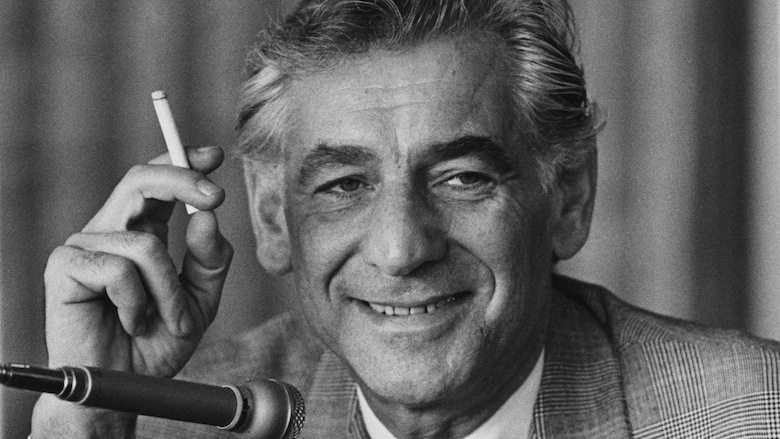
American composer, conductor, and pianist Leonard Bernstein is being celebrated with a Google Doodle on what would have been his 100th birthday.
“A larger-than-life personality, Bernstein held the baton with emphatic mannerisms, reacting to the emotion of the music mid-performance,” Google says in its Doodle description. “As Director of the New York Philharmonic, he exposed generations of young people to musical programming on television… In this way, and as a popular commentator about music on radio and TV, he made intellectual culture more accessible to the public at large.”
Here’s what you need to know about Bernstein:
1. He Studied Music At Harvard University Against His Father’s Wishes
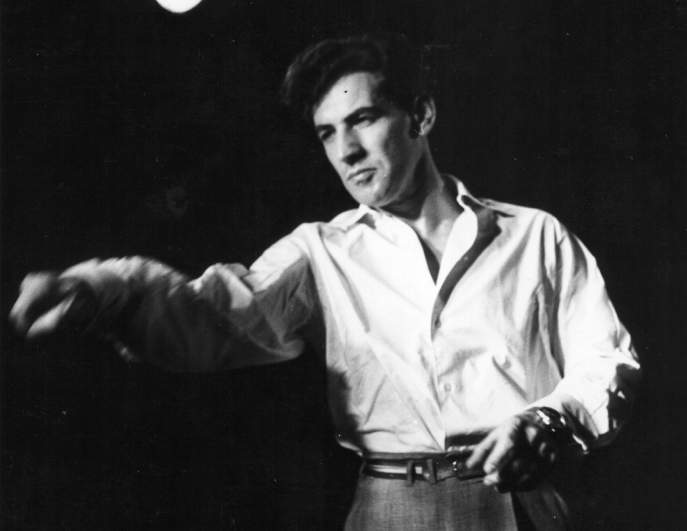
Leonard Bernstein in 1947.
Bernstein was born on August 25, 1918 in Lawrence, Massachusetts. His birth name was Louis at the insistence of his grandmother, but his parents always called him Leonard, and he legally changed his name by age 15. His mother Jennie Bernstein worked at a textile mill and his father Samuel Joseph Bernstein was a businessman and owner of a hair product store.
Bernstein first listened to a piano performance when he was a small child, and from then on he was captivated by the musical arts. He began to learn how to play after his parents acquired a cheap piano from a relative, but his father was opposed to him pursuing it as a career.
According to New England Historical Society, his father was worried that would end up a “klezmer,” which was a term used to describe a poor street musician in his native Ukraine. He felt that an American Jewish kid wouldn’t get far in a classical music world that was dominated Europeans, and that Bernstein should join the family business instead.
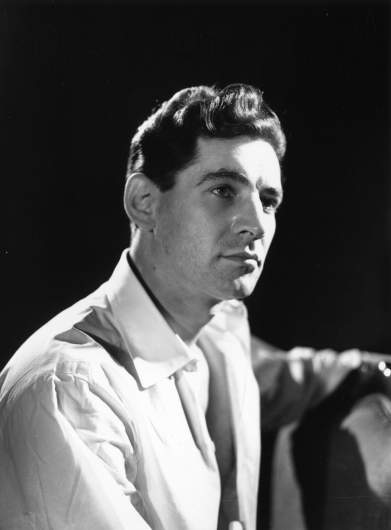
Leonard Bernstein (1918 – 1990)
Despite his father’s reservations, Bernstein followed his dream and attended Harvard University, where he graduated with a B.A. in Music in 1939. The following year, he enrolled in the Boston Symphony Orchestra’s summer school at Tanglewood under legendary composer Serge Koussevitsky. By this point, Bernstein’s father had begun to support his career, and the two even attended orchestral concerts together.
In a 1958 interview with the New Yorker, Samuel Bernstein jokingly referred to his son’s success. “Every genius had a handicap,” he said. “Beethoven was deaf. Chopin had tuberculosis. Well, someday the books will say, ‘Leonard Bernstein had a father’.”
2. He Performed Over 1200 Concerts With the New York Philharmonic & Eventually Became Laureate Conductor
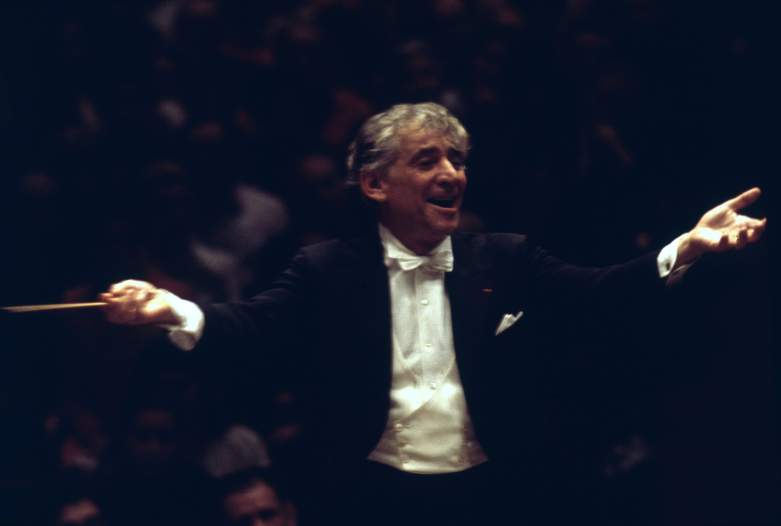
Leonard Bernstein conducts the orchestra.
Bernstein landed his first big break when he was hired as Assistant Conductor of the New York Philharmonic. He became a star on the strength of a 1943 performance at Carnegie Hall, and after being named the Music Director of the Philharmonic in 1958, his tenure would lead to more concerts with the orchestra than any previous conductor.
In addition to his duties as conductor, Bernstein wrote some of his most indelible scores during this period. He provided music for the Broadway productions of On the Town (1944), Peter Pan (1950), Wonderful Town (1953), Candide (1956), and West Side Story (1957). He relinquished his title as Music Director in 1969, but was subsequently promoted to Laureate Conductor, and would continue to perform with the Philharmonic until 1990.
In total, Bernstein’s tenure spanned 47 years, 1244 concerts, and over 200 recordings. He also won 23 Grammy Awards in categories as varied as Best Contemporary Composition and Best Classical Album. Click here for a full list of awards.
“His 11 years as our Music Director (1958-1969) and 21 years as our Laureate Conductor were periods of brilliance in the Orchestra’s history,” states the Philharmonic website. “Mr. Bernstein will be remembered for his genius, his leadership, his humanitarianism, his ability to transmit his love of music to young and old, his dedication to our Orchestra, his service to young musicians, and his unforgettable, ebullient and caring personality. We are grateful for his legacy.”
3. He Starred In a Series of Popular TV Lectures During the 1960s & 70s
During his tenure with the Philharmonic, Bernstein insisted on a clause that ensured four televised Young People’s Concerts each season. The concerts were intended to bridge the generational gap between older and younger viewers, and are now considered to be the most influential series of music appreciation programs ever produced on television. The concerts ran from 1958 to 1972 and won 5 Primetime Emmys in addition to increasing Bernstein’s celebrity.
Author Humphrey Burton told the Guardian that Bernstein was a pivotal voice for young music lovers. “He came over as warm-hearted, clever, inclusive, exciting. His was the greatest influence on us program-makers when we started BBC2 and expanded six-fold the amount of classical music on television,” he said. “Younger readers can have no idea of the influence he wielded, how he created an appetite for classical music among the general public.”
“For a decade from 1954 he delivered televised essays intended for grown-ups,” he continued. “Beethoven’s sketchbooks, the development of American musical comedy, what makes opera grand? Such subjects were grist to his mill: he was a born communicator and he had stimulating, jargon-free things to say about a broad range of musical subjects.”
In addition to the Young People’s Concerts, Bernstein also hosted the 1967 documentary Inside Pop: The Rock Revolution. The doc represented the first time that pop music had been presented on television as a legitimate art form, and it included footage of The Beach Boys’ Brian Wilson working on the legendary unreleased album SMiLE. The doc is now considered a watershed moment in music criticism.
4. He Was Known for His Outspoken Political Views & Often Worked Them Into His Music
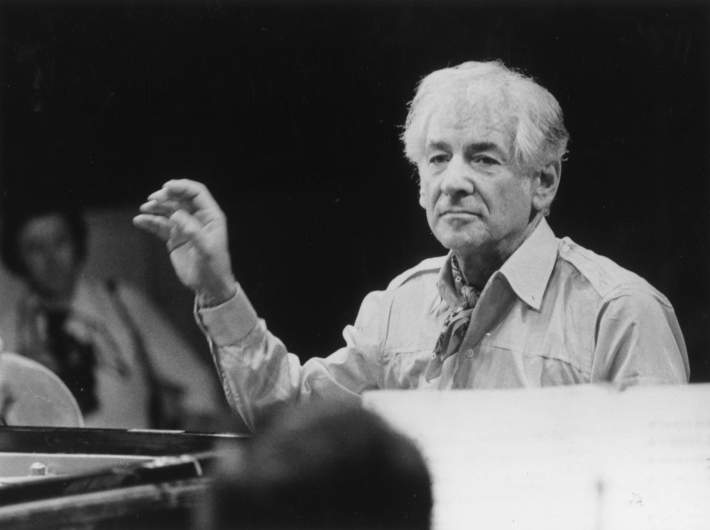
Leonard Bernstein at a tribute concert.
Bernstein was politically outspoken for most of his life. As a Harvard student, he directed a stage production of The Cradle Will Rock, which has themes of corruption and corporate greed. The local police reported him to the FBI as a result, and they kept an open file on him for over 15 years. Bernstein’s first opera, Trouble In Tahiti, also contained political rhetoric, as it criticized American civilization and suburban upper-class life.
In 1949, Bernstein was labelled a communist and blacklisted by the HUAC. It was only after he signed an affidavit saying he was not a communist that he was allowed to go back to work. He hired by Warner Bros. to compose music for the film On the Waterfront (1954), and by the time he became Music Director of the Philharmonic, he was fully rehabilitated.
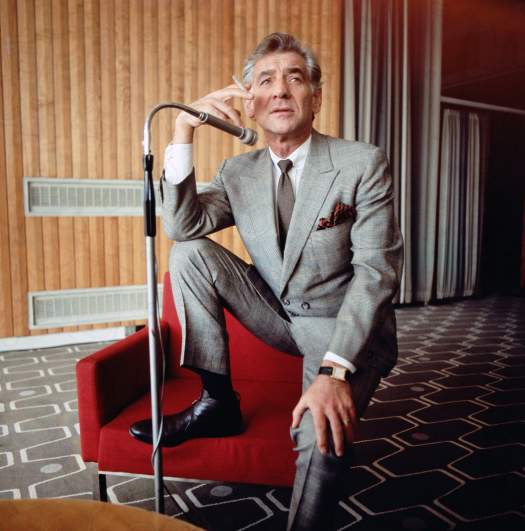
GettyLeonard Bernstein in 1970.
Bernstein was a close friend of President John F. Kennedy, and frequently spoke on behalf of the civil rights movement during the 1960s. He was part of the Stars for Freedom rally, in which 25,000 citizens marched from Selma to Montgomery to demand voting rights, and he also marched in protest of the Vietnam War.
According to biographer Barry Seldes, Bernstein’s political views often times landed him in hot water. In 1970 he hosted a party to raise funds for Black Panther organization, but when it was revealed that some of the attendees had criminal records, the conductor was leaned on by the FBI. The incident was largely forgotten about in the wake of the Watergate scandal.
5. He Died Of a Heart Attack 5 Days After Announcing His Retirement
Bernstein announced his retirement from performing on October 9, 1990. He died less than five days later from a heart attack. He was 72. According to The Music’s Over, Bernstein was a chain smoker for much of his life, and subsequently dealt with emphysema in his later years. He’s buried in Green-Wood Cemetery in Brooklyn with a copy of Mahler’s Fifth Symphony laid across his chest.
He’s buried next to his wife Felicia Montealegre, whom he married in 1951 and who passed away from lung cancer in 1978. She was 56. They had three children together: Jamie, Alexander, and Nina Bernstein. In an interview with the Guardian, Jamie reflected on her father’s musical legacy. “He thought of himself primarily as a composer and I think he’d have been particularly thrilled to find how his music is being performed and celebrated around the world in this centenary year,” she said.
“He accepted how things were, and he spent his life trying to make the world a better place,” Jamie continued. “He wanted to use his music to say what was true, to raise consciousness and be an advocate for peace. Today’s young musicians are so different from their predecessors – there is no longer the premium on their being in the ivory tower, and they’re so much more involved in the world about them. They’re called citizen artists – an expression I love, and I think my father was Citizen Artist No. 1.”